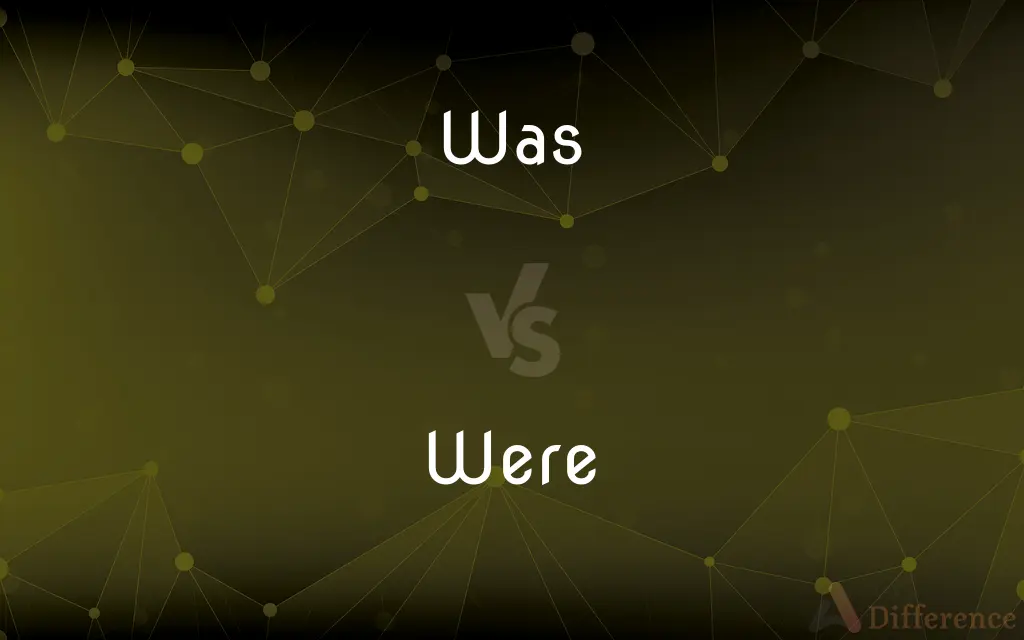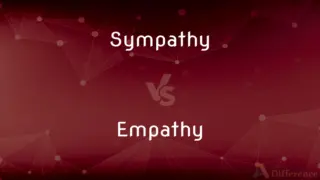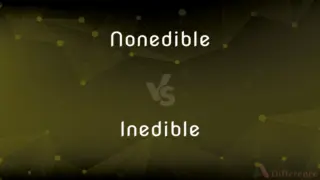Was vs. Were — What's the Difference?
By Fiza Rafique — Updated on September 21, 2023
Was and Were are both past tense forms of the verb "to be." "Was" is used with singular subjects and "Were" is used with plural subjects and in the subjunctive mood.

Difference Between Was and Were
Table of Contents
ADVERTISEMENT
Key Differences
Was is a simple past tense form of the verb "to be," commonly used with singular subjects, such as "I," "he," "she," or "it." It denotes that a person or thing was in a certain state or condition at some point in the past.
Were is also a past tense form of "to be," but it is usually used with plural subjects, like "you," "we," and "they." It also applies when talking about multiple entities like "dogs" or "buildings," indicating that they were in a certain state or condition in the past.
In English grammar, Was is more straightforward in its application, usually teaming up with singular subjects in indicative sentences. "Were," however, has a dual role as it is also used in the subjunctive mood to describe hypothetical or non-real situations.
Was is generally not used in conditional sentences that discuss hypothetical or unreal scenarios. "Were," on the other hand, is used in these types of sentences, such as "If I were rich, I would travel the world."
Though both Was and Were come from the same verb "to be," they have distinct rules and contexts that dictate their usage. They should be used correctly to ensure that the subject-verb agreement is maintained and that sentences convey the intended meaning.
ADVERTISEMENT
Comparison Chart
Subject Agreement
Singular subjects
Plural subjects
Mood
Indicative mood only
Indicative and subjunctive
Conditional Sentences
Not generally used
Often used
Examples
I was, He was
You were, They were
Formality
Standard
Standard, but subjunctive can be more formal
Compare with Definitions
Was
Past tense of "to be" for singular subjects.
He was late.
Were
Used in subjunctive mood for hypothetical scenarios.
If I were you, I would apologize.
Was
To form past continuous tense.
He was running.
Were
Used to make past tense questions.
Were you there?
Was
Used to indicate a state or condition.
The door was open.
Were
Used to indicate a state or condition in the past.
The windows were open.
Was
Used to make past tense questions.
Was she there?
Were
To form past continuous tense.
They were running.
Was
To form passive voice sentences.
The cake was eaten.
Were
Were and wer are archaic terms for adult male humans and were often used for alliteration with wife as "were and wife" in Germanic-speaking cultures (Old English: wer, Old Dutch: wer, Gothic: waír, Old Frisian: wer, Old Saxon: wer, Old High German: wer, Old Norse: verr).
Was
First and third person singular past indicative of be. See Note at you-uns.
Were
Second person singular and plural and first and third person plural past indicative of be.
Was
Inflection of be.
I was castigated and scorned.
Were
Past subjunctive of be. See Usage Notes at if, wish.
Was
Inflection of be.
It was a really humongous slice of cake.
Were
Inflection of be
John, you were the only person to see him.
Was
Used in phrases with existential there when the semantic subject is (usually third-person) plural.
There was three of them there.
Were
Inflection of be
We were about to leave.
Mary and John, you were right.
They were a fine group.
They were to be the best of friends from that day on.
Was
Inflection of be.
Were
Inflection of be
I wish that it were Sunday.
I wish that I were with you.
Was
Inflection of be
Were
(Northern England) be.
Was
Inflection of be
Were
(fandom) The collective name for any kind of person that changes into another form under certain conditions, including the werewolf.
Was
The first and third persons singular of the verb be, in the indicative mood, preterit (imperfect) tense; as, I was; he was.
Were
To wear. See 3d Wear.
Were
To guard; to protect.
Were
A weir. See Weir.
Were
A man.
Were
A fine for slaying a man; the money value set upon a man's life; weregild.
Every man was valued at a certain sum, which was called his were.
Were
The imperfect indicative plural, and imperfect subjunctive singular and plural, of the verb be. See Be.
Were
Past tense of "to be" for plural subjects.
They were late.
Common Curiosities
Can I use Was and Were interchangeably?
No, they are subject to subject-verb agreement and mood rules.
What does Was mean?
"Was" is the past tense of "to be" used with singular subjects.
Is Was used in the subjunctive mood?
No, "were" is generally used for the subjunctive.
What does Were mean?
"Were" is the past tense of "to be" used with plural subjects and in subjunctive moods.
What's the negative form of Were?
Weren't.
How do I form questions with Was?
Subject-auxiliary inversion, e.g., "Was he there?"
How do I form questions with Were?
Subject-auxiliary inversion, e.g., "Were they there?"
Can Was be used in conditional sentences?
Typically no, "were" is usually used for hypothetical conditions.
Are Was and Were contractions?
No, they are forms of the verb "to be."
Can Were be used for singular subjects?
Only in the subjunctive mood, e.g., "If I were you."
Is Was only used for singular subjects?
Generally, yes, except for "you" which can be singular but still takes "were."
What's the negative form of Was?
Wasn't.
What is the subjunctive mood?
It's used to discuss hypothetical or non-real situations.
Is Were formal language?
It's standard, but its subjunctive use can sound formal.
What are the plural subjects that go with Were?
You, we, they, and any plural nouns.
Share Your Discovery

Previous Comparison
Sympathy vs. Empathy
Next Comparison
Nonedible vs. InedibleAuthor Spotlight
Written by
Fiza RafiqueFiza Rafique is a skilled content writer at AskDifference.com, where she meticulously refines and enhances written pieces. Drawing from her vast editorial expertise, Fiza ensures clarity, accuracy, and precision in every article. Passionate about language, she continually seeks to elevate the quality of content for readers worldwide.
















































